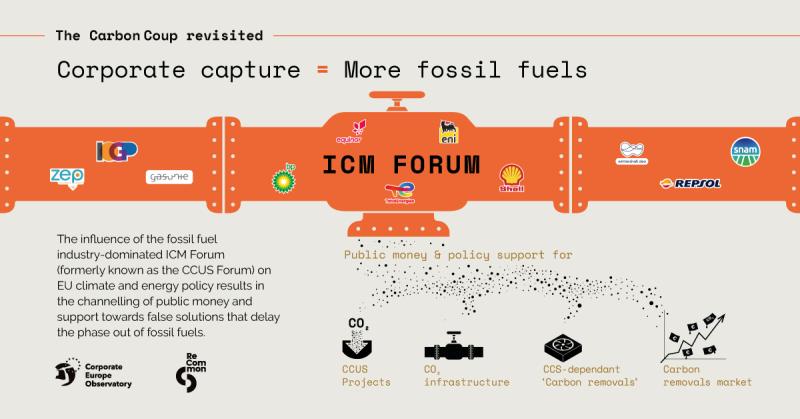Stay always informed
Interested in our articles? Get the latest information and analysis straight to your email. Sign up for our newsletter.

Brussels, 9 October 2024 – On the eve of the 4th annual Industrial Carbon Management Forum (ICM Forum) in Pau, France (10-11 October), Corporate Europe Observatory releases an update to its March Carbon Coup report. Titled Carbon Coup Revisited, the update reveals how the forum, dominated by fossil fuel companies and major polluters, continues to wield significant influence over EU’s key energy policies.
In addition, Real Zero Europe, a campaign calling on the EU to deliver real reductions in carbon emissions and real solutions to the climate crisis, has launched a new briefing titled Road to Nowhere, which challenges the efficacy of current carbon capture and removal strategies.
About the ICM Forum
Originally established by the European Commission in 2021 as the CCUS Forum, the ICM Forum was invited to steer regulation and public funding for carbon capture, associated CO2 infrastructure, and speculative ‘carbon removal’ technologies. However, the forum is heavily influenced by fossil fuel polluters like Equinor, TotalEnergies, Shell, Fluxys and Snam.
A flagship regulation, the Commission’s proposal for an Industrial Carbon Management Strategy (ICMS), copy-pasted the demands of the ICM Forum.
Key findings
Carbon Coup Revisited reveals that the fossil fuel industry is still among the newly appointed co-chairs of all four ICM Forum’s working groups, granting them outsized influence in shaping the implementation of the ICMS. The Commission's new mandates to the working group include a major role in the design and development of the CO2 infrastructure network, deciding when civil society should be involved in CCUS projects or how to strike a balance between safety, risks, cost-effectiveness and reliability.
Meanwhile, Road to Nowhere dives into carbon capture and carbon removal technologies, evidencing how plans for the large-scale use of CCS (including in bioenergy and direct air capture applications) ignore significant technical limitations and economic realities.
Belén Balanyá, Researcher and Campaigner at Corporate Europe Observatory (CEO), says:
“The oil and gas lobby knows that if it can lock-in the CO2 infrastructure, it can effectively lock-in the future of fossil fuels. That’s why it is so dangerous that the Commission has copy-pasted the ICM Forum’s demands and is now handing them the implementation of key energy policies, which would force countries to throw billions of public money at the cost of real solutions. The ICM Forum is a dangerous example of corporate capture that displays every trick of the fossil fuel lobbyists to exert undue influence, including the revolving door between the public and private sectors. The fossil fuel industry should have no place influencing climate policy.”
Emily Rochon, Adviser for AirClim and co-author of the Road to Nowhere briefing, says:
"CCS has failed to deliver for the power sector. Any notion that CDR technologies that rely on CCS, including bioenergy and direct air capture applications, will reduce or offset industrial sector emissions and help achieve net zero goals is pure fantasy. Existing solutions, including renewable energy, energy efficiency, and electrification, are the only way to safely, effectively, and cost-efficiently "manage" industrial section carbon emissions."
ENDS
For media inquiries, please contact
Belén Balanyá, Corporate Europe Observatory researcher and campaigner
+31633090386, belen@corporateeurope.org
Emily Rochon, Adviser for AirClim
+32 468 56 4185, emily.refutures@gmail.com
Notes to editor
• Carbon Coup Revisited can be downloaded here.
• Road to Nowhere: CCS and CDR technologies won't deliver for the climate can be downloaded here.
• The Industrial Carbon Management Strategy (ICMS) aims to scale up CCUS, CDR, and CO2 transport infrastructure. Following ICM Forum demands, the Commission plans to develop 19,000 km of CO2 pipelines and shipping routes in Europe by 2040, despite risks of leaks, ruptures, and significant environmental and safety hazards, including asphyxiation
• Carbon capturing technologies have been trialled for over 50 years, to the tune of $83 billion+ globally, to negligible results. Today, EU countries capture just 1,9 Mt CO2 per year the majority of which (1,7 Mt CO2) is by Norway– and permanently stores none of it.
Additional Information
• A recent example of conflict of interests on the ICM Forum is Johanna Fiksdahl, who moved to Equinor straight after working directly on the ICMS at DG Energy (seconded by the Norwegian Ministry of Petroleum and Energy, where she was for more than 10 years).
• Current and former MEPs involved in the annual forums are closely tied to the fossil fuel industry or have frequently met with oil and gas lobbyists. This includes the former rapporteur on the 2009 CCS Directive, Christopher Davies, who played an instrumental role in securing public funding for CCS and now heads lobby group CCS Europe and works for Rud Pedersen Public Affairs, a lobby firm with fossil fuel clients. Davies privately commented upon the compromised amendments on CCS tabled by EPP MEP Christian Ehler, rapporteur on the recent CCUS-enabling Net Zero Industry Act.
• The official programme for ICM Forum includes two site visits hosted by French fossil fuel companies: oil and gas major TotalEnergies and gas transport and storage company Teréga.